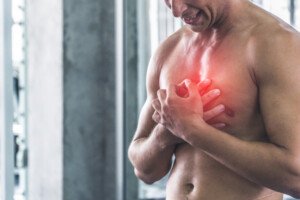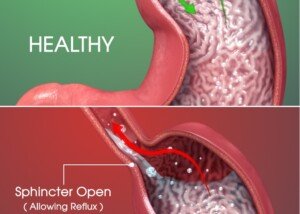
You may already know that GERD can cause chest pain, but what about severe or intense pain, which can frighten people into thinking that their heart is in serious trouble?
Severe Chest Pain from Exercise: GERD vs. Heart Problem
“Exercise increases the demand for more blood in the heart and skeletal muscles,” says Hugh Mai, MD, a gastroenterology and internal medicine specialist in Baltimore, MD.
“So when chest pain occurs during exercise, the first thing that MUST be ruled out is coronary artery disease because angina [chest pain] can be a signal that the heart is not getting enough blood,” explains Dr. Mai.
“Once that is ruled out with the appropriate cardiac tests, other causes should be considered including GERD.”
GERD stands for gastroesophageal reflux disease. Diagnosing this can wait, but diagnosing a heart problem cannot wait!
Now let’s suppose that a cardiac cause of your severe chest pain during exercise has been ruled out, and other tests point to GERD or acid reflux.
Dr. Mai continues, “Individuals can try taking antacids or taking a medication that suppresses gastric acid before exercising to see if that prevents the chest pain.
“However, if the chest pain still persists, further testing should be done such as an endoscopy, a 24-hour esophageal acid pH study and impedance, and a manometry test to detect if esophageal spasms — contractions that cause pain when food is moving through the esophagus — are being induced by acid reflux during exercise.”
An esophageal spasm can be severe or intense in degree of pain. It can make someone think they’re having a heart attack. The esophagus is a muscle, and muscles can go into spasm.
Think of how painful a muscle spasm in your calf or the arch of your foot is.
Likewise, a spasm of the esophageal muscle can bring on quite a lot of pain – smack under your chest bone.
Eating As the Only Cause
Dr. Mai adds, “Another fact to be aware of is that so-called nutcracker esophagus or diffuse esophageal spasm can cause intense chest pain, usually associated with acid reflux after meals and not typically during exercise.”
 Hugh Mai, MD, has 35+ years of experience and is well-versed in the endoscopic treatment of GERD. His areas of focus include interventional endoscopy, metabolic endoscopy and gut health.
Hugh Mai, MD, has 35+ years of experience and is well-versed in the endoscopic treatment of GERD. His areas of focus include interventional endoscopy, metabolic endoscopy and gut health.
 Lorra Garrick has been covering medical, fitness and cybersecurity topics for many years, having written thousands of articles for print magazines and websites, including as a ghostwriter. She’s also a former ACE-certified personal trainer.
Lorra Garrick has been covering medical, fitness and cybersecurity topics for many years, having written thousands of articles for print magazines and websites, including as a ghostwriter. She’s also a former ACE-certified personal trainer.
.









































